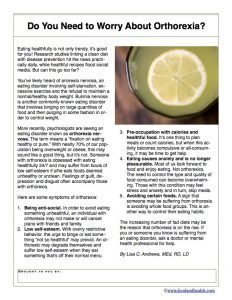Do You Need to Worry About Orthorexia?
Eating healthfully is not only trendy, it’s good for you! Research studies linking a clean diet with disease prevention hit the news practically daily, while healthful recipes flood social media. But can this go too far?You’ve likely heard of anorexia nervosa, an eating disorder involving self-starvation, excessive exercise and the refusal to maintain a normal/healthy body weight. Bulimia nervosa is another commonly-known eating disorder that involves binging on large quantities of food and then purging in some fashion in order to control weight.More recently, psychologists are seeing an eating disorder known as orthorexia nervosa. The term means a “fixation on eating healthy or pure.” With nearly 70% of our population being overweight or obese, this may sound like a good thing, but it’s not. Someone with orthorexia is obsessed with eating healthfully 24/7 and may suffer from bouts of low self-esteem if s/he eats foods deemed unhealthy or unclean. Feelings of guilt, depression and disgust often accompany those with orthorexia.Here are some symptoms of orthorexia:
- Being anti-social. In order to avoid eating something unhealthful, an individual with orthorexia may not make or will cancel plans with friends and family.
- Low self-esteem. With overly restrictive behavior, the urge to binge or eat something “not so healthful” may prevail. An orthorexic may degrade themselves and suffer low self-esteem when they eat something that’s off their normal menu.
- Preoccupation with calories and healthful food. It’s one thing to plan meals or count calories, but when this activity becomes compulsive or all-consuming, then it may be time to get help.
- Eating causes anxiety and is no longer pleasurable. Most of us look forward to food and enjoy eating. Not orthorexics. The need to control the type and quality of food consumed can become overwhelming. Those with this condition may feel stress and anxiety and in turn, skip meals.
- Avoiding certain foods. A sign that someone may be suffering from orthorexia is avoiding whole food groups. This is another way to control their eating habits.
The increasing number of fad diets may be the reason that orthorexia is on the rise. If you or someone you know is suffering from an eating disorder, ask a doctor or mental health professional for help.By Lisa C. Andrews, MEd, RD, LDReferences:
- eatingdisorderhope.com/information/anorexia
- https://www.nationaleatingdisorders.org/bulimia-nervosa
- Orthorexia: An Obsession with Eating “Pure”. The Academy of Nutrition and Dietetics. www.eatright.org
- Hill, Amelia (16 August 2009). “Healthy food obsession sparks rise in new eating disorder.” The Guardian. Accessed 7 August 2013.



